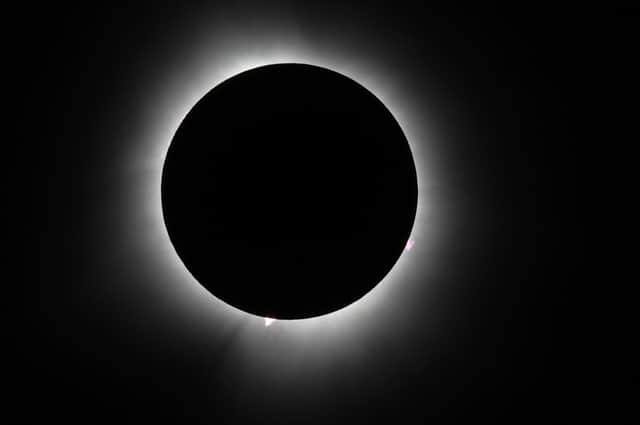Northern Ireland misses out on solar eclipse phenomenon


Eclipse mania gripped all of Mexico, the US and Canada, as the moon swept in front of the sun, blotting out daylight.
Although a partial eclipse of the sun was, in theory, visible from Northern Ireland, poor weather conditions and the onset of darkness meant few will have got even a glimpse.
Advertisement
Hide AdAdvertisement
Hide AdNorthern and western Scotland were the only parts of the UK where the skies were clear enough to enjoy the spectacle.
BBC Weather presenter Simon King said there was too much cloud to see much, or any, of the partial eclipse – which would have otherwise been visible from western parts of the UK from 7.55pm until sunset.
He said: "However, there was always a chance in northern and western Scotland of some clearer spells and that's where at least a couple of our BBC weather watchers were able to capture a partial eclipse.”
Met Office forecaster Simon Partridge added: "The chances are most of England and Wales probably wouldn't have seen it anyway."
Advertisement
Hide AdAdvertisement
Hide AdThe Met Office had predicted that the whole of Northern Ireland would be covered by a blanket of cloud of varying thickness at 8pm, with rainfall in the mid and east … and so it proved.
However, would-be eclipse-gazers need not despair according to Marc Sarzi, Armagh Planetarium’s head of research: there will be a chance to catch a total eclipse in summer 2026 – if they are holidaying in Spain or Portugal at the time.
The next eclipse which is predicted to be visible from Northern Ireland will not be until March 29, 2025, though it will be only a partial one. No-one on earth is due to see another full eclipse until August 12, 2026.
Mr Sarzi said that eclipses, even total ones, are really not very rare events, and happen perhaps every year-and-a-half in various places across the Earth. But many of these are in virtually uninhabited areas like Antarctica or the Pacific Ocean and are not observed.
Although partial eclipses are not uncommon – occurring every few years – the next full eclipse visible from the island of Ireland will take place on September 23, 2090.
Comment Guidelines
National World encourages reader discussion on our stories. User feedback, insights and back-and-forth exchanges add a rich layer of context to reporting. Please review our Community Guidelines before commenting.